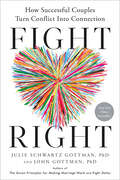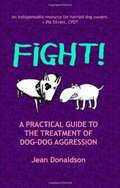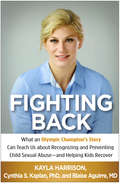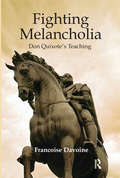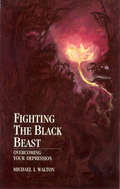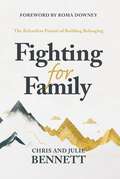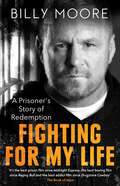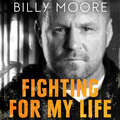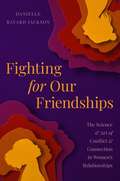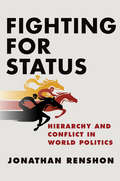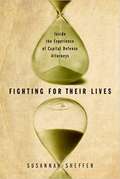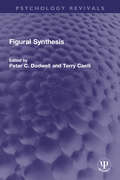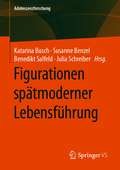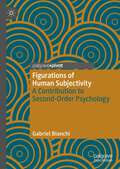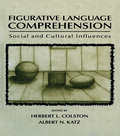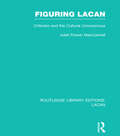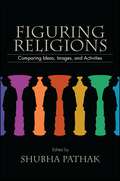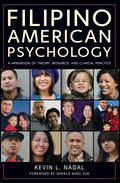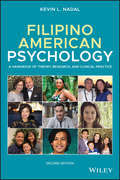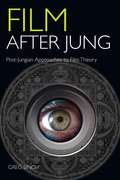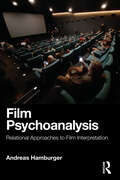- Table View
- List View
Fight Right: How Successful Couples Turn Conflict Into Connection
by John Gottman Julie Schwartz GottmanNEW YORK TIMES BESTSELLER • LEARN THE 5 SECRETS OF SUCCESSFUL COUPLESConflict is the top reason couples seek help—but it's also an opportunity for greater intimacy, deeper connection, and lasting love according to this essential guide from the world&’s leading relationship scientists and authors of The Seven Principles for Making Marriage Work and Eight Dates.&“An indispensable resource that couples will use over and over again.&”—Lori Gottlieb, New York Times bestselling author of Maybe You Should Talk to SomeoneHow we fight predicts the future of our relationships. Most of us blunder into conflict without knowing what we are really fighting about and then quickly become overwhelmed by physiological responses we can&’t control and emotions we don&’t anticipate. The truth is the happiest and most successful couples fight—all the time. Conflict is human, and necessary.Through decades of research, Drs. John and Julie Gottman, founders of the world-famous Love Lab, have identified the five common mistakes we make when we are at odds. In Fight Right, we learn the five secrets that help us to get back on track and harness conflict to build stronger, healthier relationships. With kindness, clarity, and a deep understanding of the struggles couples are going through, the Gottmans show us that we each have a unique conflict culture, borne of how we were raised and how we experienced past relationships, and they take us through all the possible combinations, from Avoiders, to Validators, to Volatiles, and how they can best work together. Fight Right is an essential resource that will help couples escape the win-or-lose mentality in favor of a collaborative approach: calming down, staying connected, and really understanding, so that our fights can bring us closer.
Fight Time: The Normative Rules and Routines of Interpersonal Violence
by Terance D. Miethe Gini R. DeibertA scholarly study of violence including violence in war, the family, the streets, sports and more.
Fight!: A Practical Guide to the Treatment of Dog-Dog Aggression
by Jean DonaldsonIs it fear or bravado that causes some dogs to want to "take on" other dogs? Learn how to analyze the underlying causes for dog-dog aggression and retrain your dog so she can play nicely with others.
Fighting Back: What an Olympic Champion's Story Can Teach Us about Recognizing and Preventing Child Sexual Abuse--and Helping Kids Recover
by Kayla Harrison Cynthia S. Kaplan Blaise AguirreTwo-time Olympic gold medalist Kayla Harrison has always been a fighter--yet as a young teen, no one knew she was also a victim. Combining Kayla's powerful story of sexual abuse by her judo coach with science-based information from two renowned therapists, this unique book provides critical guidance for parents and professionals. Learn how to spot the signs that a child or teen is being groomed, why kids stay silent about their trauma, how they struggle with self-blame and the brutal betrayal of a trusted authority figure, and exactly what kind of help they need to recover. No one is more qualified than Kayla and her expert coauthors to explain the impact of child sexual abuse--and what you can do to keep kids safe.
Fighting Melancholia: Don Quixote's Teaching
by Francoise DavoineFrancoise Davoine has been investigating psychotic phenomena and trauma for over thirty years, in collaboration with Jean-Max Gaudilliere. In this book, she draws on her literary background to take the reader on a fascinating voyage with an unexpected but most helpful guide: Don Quixote. In her work, Davoine approaches madness not as a symptom, but rather as a place, the place where the symbolic order and the social link have ruptured. She sees the psychotic as a seeker, engaged in a form of exploration into the nature and history of this place. This brings us to the seeker Don Quixote. Davoine takes the reader into the world of the knight-errant, to describe his adventures in a fascinating new light.Cervantes, the survivor of war trauma, captivity, and all manner of misfortunes, created this hero, first and foremost, so that the tale be told.
Fighting The Black Beast: Overcoming Your Depression
by Michael L WaltonSadly, no one can wave a magic wand over your head and remove your depression and when caught in a downward spiral of negativity the victim of this very common disorder may consider suicide as the only answer.However, the author of Fighting the Black Beast has found a self-help method that really works. Having overcome his own depression he now offers you his 'Eight Point Plan' as a life-line. This book offers you a powerful weapon against the 'Black Beast' of depression and the means with which to fight and overcome it altogether.Fighting the Black Beast shows that the dark world of depression is largely a self-created hell, and the downward spiral can be reversed. Recovery is at last made possible.
Fighting for Family: The Relentless Pursuit of Building Belonging
by Chris Bennett Julie BennettA husband-and-wife team put their philosophy of &“We don&’t quit on family&” into action, demonstrating how to combat isolation, build healthy relationships, and fight for (not with!) the ones you love, right where you are.When Chris and Julie Bennett and their four kids decided to move from Norman, Oklahoma, to Los Angeles, they knew they were setting out on a great adventure. They&’d be leaving behind the church Chris and Julie had pastored, the comfort of their community, and the familiarity of their daily routines, but the new city promised to bring some much-needed change. Most of all, they looked forward to connecting with others in one of the most disconnected cities in the United States.What they didn&’t expect was how this adventure—complicated by a cancer diagnosis, a relapse, and a worldwide pandemic—would challenge their notions of what it means to care for each other well, both as a nuclear family and as part of a broader community. It turns out that becoming family is stressful, messy, exhausting—and absolutely, totally worth fighting for.In a time when so many suffer from loneliness and it feels like developing authentic relationships is impossible, Chris and Julie invite you to step into their story to discover the fundamentals that lead to healthy, thriving families and friendships. You&’ll discover the power of embracing vulnerability, accepting imperfection, and extending forgiveness, while finding fulfillment through enforcing boundaries and honoring and serving others.Whether you are looking to build your own community from scratch or strengthen your existing connections, Fighting for Family will inspire you to go all in on your relationships, no matter what your circumstances.
Fighting for My Life: A Prisoner's Story of Redemption
by Billy Moore'The next round in Billy's fight is pain-racked, frank and reflective . . . an inspiring piece from a man who's been to hell and back and has the scars to prove it'JOE COLE'Brutally honest, dark and disturbing. A book that tells of the reality of drugs and a failing prison system'NEIL SAMWORTH, author of Strangeways: A Prison Officer's Story'His life may have had many ups and downs, but Billy is a wonderful example of never giving up'JAMES ENGLISH'A true story of forgiveness, not only learning to forgive others but also learning to forgive yourself. An incredibly emotional story about an incredible man who's had an incredible journey'LIAM HARRISON'This time I am telling the story of my life both before prison in Thailand and what followed once I was back in the United Kingdom, my cancer diagnosis, more prison time and, finally, redemption. I am trying to understand aspects of my childhood that had a role in my eventual downward spiral into addiction, pain, misery and loss'BILLY MOOREBilly Moore spent three years in Klong Prem prison in Thailand, popularly known as the 'Bangkok Hilton', where he witnessed acts of extreme violence and sexual assault. Eventually he found purpose through taking part in Muay Thai boxing tournaments in jail. Here, he found 'a wall of human community' amongst the elite boxers and regained his sobriety. He was granted early release by the King of Thailand having excelled as a Muay Thai boxer in inter-prison tournaments. But back in the UK and a decade later - with his demons resurfacing - Billy's past caught up with him. He was caught and convicted of a burglary and was despatched to HMP Walton under then home secretary Theresa May's three-strikes rule. Billy has spent almost twenty-two years in various prisons, but since then, he has not only survived cancer, but also gone on to become a powerful advocate of boxing and anti-knife crime initiatives in the Liverpool area, training young boxers.A Prayer Before Dawn was made into a film directed by Jean-Stéphane Sauvaire and starring Joe Cole, of Peaky Blinders' fame. The film premiered at the Cannes Film Festival in 2017, but by the time it went on general release, Billy was back in prison in the UK. In this follow-up to Billy's first international bestseller, an autobiography set largely in Thailand's infamous prison system, Billy sets out to explore his experience of childhood abuse that would lead to a life of drug addiction and near-constant incarceration. After Billy's sentence in Klong Prem prison was commuted as a result of his extraordinary success as a Muay Thai boxer, he returned to the UK.In this vividly told story, Liverpudlian Billy contrasts his first-hand experience of one of the cruellest prison systems in the world with his experience of UK prisons. The result is, in part, a shocking exposé of the inadequacy of care and the lack of humanity in British prisons. But Billy's story is mainly one of rehabilitation, recovery and redemption. Rich in detail, honesty and humour, his book is a fast-paced, unputdownable read which shows how the human spirit can endure and eventually thrive.
Fighting for My Life: A Prisoner's Story of Redemption
by Billy Moore'The next round in Billy's fight is pain-racked, frank and reflective . . . an inspiring piece from a man who's been to hell and back and has the scars to prove it'JOE COLE'Brutally honest, dark and disturbing. A book that tells of the reality of drugs and a failing prison system'NEIL SAMWORTH, author of Strangeways: A Prison Officer's Story'Billy Moore writes with such a tragic authenticity that it kept me willing for him to succeed, even as I knew he was never too far from self-destruction. It's his self-awareness that I admire - unflinching and brutal and also, it should be said, his wonderful way with words'Professor Emeritus DAVID WILSON, author of My Life with Murderers'His life may have had many ups and downs, but Billy is a wonderful example of never giving up'JAMES ENGLISH'A true story of forgiveness, not only learning to forgive others but also learning to forgive yourself. An incredibly emotional story about an incredible man who's had an incredible journey'LIAM HARRISON'This time I am telling the story of my life both before prison in Thailand and what followed once I was back in the United Kingdom, my cancer diagnosis, more prison time and, finally, redemption. I am trying to understand aspects of my childhood that had a role in my eventual downward spiral into addiction, pain, misery and loss'BILLY MOOREBilly Moore spent three years in Klong Prem prison in Thailand, popularly known as the 'Bangkok Hilton', where he witnessed acts of extreme violence and sexual assault. Eventually he found purpose through taking part in Muay Thai boxing tournaments in jail. Here, he found 'a wall of human community' amongst the elite boxers and regained his sobriety. He was granted early release by the King of Thailand having excelled as a Muay Thai boxer in inter-prison tournaments. But back in the UK and a decade later - with his demons resurfacing - Billy's past caught up with him. He was caught and convicted of a burglary and was despatched to HMP Walton under then home secretary Theresa May's three-strikes rule. Billy has spent almost twenty-two years in various prisons, but since then, he has not only survived cancer, but also gone on to become a powerful advocate of boxing and anti-knife crime initiatives in the Liverpool area, training young boxers.A Prayer Before Dawn was made into a film directed by Jean-Stéphane Sauvaire and starring Joe Cole, of Peaky Blinders' fame. The film premiered at the Cannes Film Festival in 2017, but by the time it went on general release, Billy was back in prison in the UK. In this follow-up to Billy's first international bestseller, an autobiography set largely in Thailand's infamous prison system, Billy sets out to explore his experience of childhood abuse that would lead to a life of drug addiction and near-constant incarceration. After Billy's sentence in Klong Prem prison was commuted as a result of his extraordinary success as a Muay Thai boxer, he returned to the UK.In this vividly told story, Liverpudlian Billy contrasts his first-hand experience of one of the cruellest prison systems in the world with his experience of UK prisons. The result is, in part, a shocking exposé of the inadequacy of care and the lack of humanity in British prisons. But Billy's story is mainly one of rehabilitation, recovery and redemption. Rich in detail, honesty and humour, his book is a fast-paced, unputdownable read which shows how the human spirit can endure and eventually thrive.
Fighting for My Life: A Prisoner's Story of Redemption
by Billy Moore'The next round in Billy's fight is pain-racked, frank and reflective . . . an inspiring piece from a man who's been to hell and back and has the scars to prove it'JOE COLE'Brutally honest, dark and disturbing. A book that tells of the reality of drugs and a failing prison system'NEIL SAMWORTH, author of Strangeways: A Prison Officer's Story'Billy Moore writes with such a tragic authenticity that it kept me willing for him to succeed, even as I knew he was never too far from self-destruction. It's his self-awareness that I admire - unflinching and brutal and also, it should be said, his wonderful way with words'Professor Emeritus DAVID WILSON, author of My Life with Murderers'His life may have had many ups and downs, but Billy is a wonderful example of never giving up'JAMES ENGLISH'A true story of forgiveness, not only learning to forgive others but also learning to forgive yourself. An incredibly emotional story about an incredible man who's had an incredible journey'LIAM HARRISON'This time I am telling the story of my life both before prison in Thailand and what followed once I was back in the United Kingdom, my cancer diagnosis, more prison time and, finally, redemption. I am trying to understand aspects of my childhood that had a role in my eventual downward spiral into addiction, pain, misery and loss'BILLY MOOREBilly Moore spent three years in Klong Prem prison in Thailand, popularly known as the 'Bangkok Hilton', where he witnessed acts of extreme violence and sexual assault. Eventually he found purpose through taking part in Muay Thai boxing tournaments in jail. Here, he found 'a wall of human community' amongst the elite boxers and regained his sobriety. He was granted early release by the King of Thailand having excelled as a Muay Thai boxer in inter-prison tournaments. But back in the UK and a decade later - with his demons resurfacing - Billy's past caught up with him. He was caught and convicted of a burglary and was despatched to HMP Walton under then home secretary Theresa May's three-strikes rule. Billy has spent almost twenty-two years in various prisons, but since then, he has not only survived cancer, but also gone on to become a powerful advocate of boxing and anti-knife crime initiatives in the Liverpool area, training young boxers.A Prayer Before Dawn was made into a film directed by Jean-Stéphane Sauvaire and starring Joe Cole, of Peaky Blinders' fame. The film premiered at the Cannes Film Festival in 2017, but by the time it went on general release, Billy was back in prison in the UK. In this follow-up to Billy's first international bestseller, an autobiography set largely in Thailand's infamous prison system, Billy sets out to explore his experience of childhood abuse that would lead to a life of drug addiction and near-constant incarceration. After Billy's sentence in Klong Prem prison was commuted as a result of his extraordinary success as a Muay Thai boxer, he returned to the UK.In this vividly told story, Liverpudlian Billy contrasts his first-hand experience of one of the cruellest prison systems in the world with his experience of UK prisons. The result is, in part, a shocking exposé of the inadequacy of care and the lack of humanity in British prisons. But Billy's story is mainly one of rehabilitation, recovery and redemption. Rich in detail, honesty and humour, his book is a fast-paced, unputdownable read which shows how the human spirit can endure and eventually thrive.
Fighting for Our Friendships: The Science and Art of Conflict and Connection in Women's Relationships
by Danielle Bayard JacksonWhy are women's friendships so deep yet so fragile? Friendship coach and educator Danielle Bayard Jackson unpacks the latest research about women's cooperation and communication, while sharing practical strategies to preserve and strengthen these relationships.Fighting for Our Friendships is one part textbook, one part handbook. Readers will not only learn what the latest research has to say about the mechanics of women's friendships, but they'll walk away with real-life solutions for the most common conflicts that arise in their platonic relationships. Using a combination of psychology, science, narrative, and a few of the author's signature scripts and out-of-the-box exercises, readers will learn: The three "affinities" that bring women together (and tear them apart) Scripts to navigate nine of the most challenging "friend types" (and how to know which one you are) The covert strategies women use to hurt each other (and how to avoid them) How to have a hard conversation with a friend (without losing the friendship) Surprising ways that women's people-pleasing delays platonic intimacy (and how to stop it) How to know if a friendship is worth saving (and what to do to recover) How to make (and deepen!) connections with other women In a time when we are often encouraged to opt out of friendships at any sign of friction, Danielle Bayard Jackson is showing us how to opt in.
Fighting for Status: Hierarchy and Conflict in World Politics
by Jonathan RenshonThere is widespread agreement that status or standing in the international system is a critical element in world politics. The desire for status is recognized as a key factor in nuclear proliferation, the rise of China, and other contemporary foreign policy issues, and has long been implicated in foundational theories of international relations and foreign policy. Despite the consensus that status matters, we lack a basic understanding of status dynamics in international politics. The first book to comprehensively examine this subject, Fighting for Status presents a theory of status dissatisfaction that delves into the nature of prestige in international conflicts and specifies why states want status and how they get it.What actions do status concerns trigger, and what strategies do states use to maximize or salvage their standing? When does status matter, and under what circumstances do concerns over relative position overshadow the myriad other concerns that leaders face? In examining these questions, Jonathan Renshon moves beyond a focus on major powers and shows how different states construct status communities of peer competitors that shift over time as states move up or down, or out, of various groups.Combining innovative network-based statistical analysis, historical case studies, and a lab experiment that uses a sample of real-world political and military leaders, Fighting for Status provides a compelling look at the causes and consequences of status on the global stage.
Fighting for Their Lives: Inside the Experience of Capital Defense Attorneys
by Susannah ShefferHow do attorneys who represent clients facing the death penalty cope with the stress and trauma of their work? Through conversations with twenty of the most experienced and dedicated post-conviction capital defenders in the United States, Fighting for Their Lives explores this emotional territory for the first time. What it is like for these capital defenders in their last visits or phone calls with clients who are about to be taken to the execution chamber? Or the next mornings, in their lives with their families, in their dreams and flashbacks and moments alone in the car? What is it like to do this work year after year? (These attorneys had, on average, spent nineteen years doing capital defense.) Through vivid interviews amplified by the author's responses and commentary, these attorneys reveal aspects of their internal experience that they have never talked about until now. How do capital defenders manage the weight of the responsibility they carry? To what extent do they experience symptoms of trauma in the aftermath of losing a client to execution or as a result of the cumulative effects of engaging in capital defense work? What motivates them, and what do they draw upon, in order to keep engaging in such emotionally demanding work? Have they considered practicing other types of law? What can we learn from capital defenders not only about the deep and long-term effects of the death penalty but also about broader human questions of hope, effectiveness, success, failure, strength, fragility, and perseverance?
Fighting for Their Lives: Inside the Experience of Capital Defense Attorneys
by Susannah ShefferHow do attorneys who represent clients facing the death penalty cope with the stress and trauma of their work? Through conversations with twenty of the most experienced and dedicated post-conviction capital defenders in the United States, Fighting for Their Lives explores this emotional territory for the first time. What it is like for these capital defenders in their last visits or phone calls with clients who are about to be taken to the execution chamber? Or the next mornings, in their lives with their families, in their dreams and flashbacks and moments alone in the car? What is it like to do this work year after year? (These attorneys had, on average, spent nineteen years doing capital defense.) Through vivid interviews amplified by the author's responses and commentary, these attorneys reveal aspects of their internal experience that they have never talked about until now. How do capital defenders manage the weight of the responsibility they carry? To what extent do they experience symptoms of trauma in the aftermath of losing a client to execution or as a result of the cumulative effects of engaging in capital defense work? What motivates them, and what do they draw upon, in order to keep engaging in such emotionally demanding work? Have they considered practicing other types of law? What can we learn from capital defenders not only about the deep and long-term effects of the death penalty but also about broader human questions of hope, effectiveness, success, failure, strength, fragility, and perseverance?
Figural Synthesis (Psychology Revivals)
by Peter C. Dodwell; Terry CaelliThe aim of this book, originally published in 1984, was to bring together a number of approaches to this important topic. Significant advances had been made in the two decades before publication in our understanding of many aspects of the coding that occurs along the visual pathways. The major developments had been associated with probing the nature of "logical" processes, whether physiologically or psychophysically, and relatively less attention had been devoted to the problem of how such locally coded knowledge is put together to yield coherent representations of spatially (and temporally) extended patterns – that is, to figural synthesis. Thus, while a great deal was known about the responses of individual cells in the visual system to controlled stimulation, and about the specificity of the orientational and spatial-frequency tuning of channels assessed psychophysically, there had been much less discussion of how such knowledge could be brought to bear on the general problems of understanding pattern recognition.
Figurationen spätmoderner Lebensführung (Adoleszenzforschung #10)
by Susanne Benzel Julia Schreiber Benedikt Salfeld Katarina BuschDer Band versammelt Beiträge, die sich dem Konnex von Psyche und Gesellschaft widmen, wie er auch im Zentrum der Arbeiten von Benigna Gerisch und Vera King steht. Anhand unterschiedlicher Themen wie Adoleszenz, Migration, Alter, Geschlecht und Generationenverhältnisse werden verschiedene Dimensionen spätmoderner Lebensführung beleuchtet. Übergreifend wird so der Frage nachgegangen, wie das Ineinandergreifen von psychischen und sozialen Dynamiken untersucht und verstanden werden kann.
Figurations of Human Subjectivity: A Contribution to Second-Order Psychology
by Gabriel BianchiThis book takes an empirically grounded perspective on research in values, intimacy and sexuality, among other topics in psychology, to highlight the importance of searching for human subjectivity in its diversity, plurality and self-generativity. The author conducts an in-depth discussion on the methodological and epistemological issues enabling the study of subjectivity, and argues that in order to improve the contribution of psychology to human knowledge, a study of subjectivity must be at the forefront.This book presents a critical reflection of the author’s decades-long research within psychology to argue for a significant paradigm shift in the conception and execution of psychological research: a shift to “second order psychology”.
Figurative Language Comprehension: Social and Cultural Influences
by Herbert L. Colston Albert N. KatzFigurative language, such as verbal irony, metaphor, hyperbole, idioms, and other forms is an increasingly important subfield within the empirical study of language comprehension and use. Figurative Language Comprehension: Social and Cultural Influences is an edited scholarly book that ties together recent research concerning the social and cultural influences on figurative language cognition. These influences include gender, cultural differences, economic status, and inter-group effects, among others. The effects these influences have on people's use, comprehension, and even processing of figurative language, comprise the main theme of this volume. No other book offers such a look at the social and cultural influences on a whole family of figurative forms at several levels of cognition. This volume is of great interest to scholars and professionals in the disciplines of social and cognitive psychology, psycholinguistics, and second language acquisition, as well as cognitive and other fields of linguistics where scholars have interests in pragmatics, metaphor, symbol, discourse, and narrative. Some knowledge of the empirical and experimental methods used in language research, as well as some familiarity with theories underlying the use, comprehension, and processing of figurative language would be helpful to readers of this book.
Figuring Lacan: Criticism and the Unconscious (Routledge Library Editions: Lacan)
by Juliet Flower MacCannellIt could be argued that the influence of Lacan on modern literary studies has been greater than anyone’s. Lacan has historicised the universal or mythic perceptions of Freud, and thus lent a new status to literature as a cultural artefact. This book, originally published in 1986, aims to delineate the trends in the uses made of Lacan today; to examine the theoretical substructure by which his work is accommodated to literature; and to analyse the way in which his work ‘models’ the formal relation of the literary text to other texts, to history and to politics.
Figuring Religions: Comparing Ideas, Images, and Activities
by Shubha PathakFiguring Religions offers new ways of comparing prominent features of the world's religions. Comparison has been at the heart of religious studies as a modern academic discipline, but comparison can be problematic. Scholars of religion have been faulted for ignoring or reinterpreting differences to create a universal paradigm. In reaction, many of today's scholars have placed chief emphasis on the differences between traditions. Seeking to reinvigorate comparison and avoid its excesses, contributors to this volume use theories of metaphor and metonymy from the fields of philosophy, linguistics, and anthropology to look at religious ideas, images, and activities. Traditions considered include Hinduism, ancient Greek religions, Judaism, Buddhism, Daoism, Confucianism, Christianity, and Islam. By applying trope theories, contributors reveal elements of these religions in and across their cultural contexts.
Filial Therapy: Strengthening Parent-child Relationships Through Play
by Rise VanFleetSince the first edition of this book was first published in 1984, public and professional interest in Filial Therapy has grown substantially throughout the world. Research on the approach continues to grow. The third edition elaborates on the principles, values, and theories on which Filial Therapy is based and updates the research as well as the applications of the method to a wide range of presenting problems. References have been updated, derivative formats have been included, and the method's multicultural value continues to be highlighted.
Filipino American Psychology
by Kevin L. NadalPraise for Filipino American Psychology: A Handbook of Theory, Research, and Clinical Practice "Filipino American Psychology: A Handbook of Theory, Research, and Clinical Practice is destined to make a major contribution to the field of Asian American psychology and to the larger field of multicultural psychology. " -From the Foreword by Derald Wing Sue, PhD Professor of Psychology and Education, Teachers College, Columbia University "Dr. Nadal has done a superb job of locating the experiences of Filipino Americans within the larger scholarship on ethnic minority psychology, while also highlighting the complexity, richness, and uniqueness of their psychological experiences. This book should be a part of everyone's library. " -E. J. R. David, PhD Assistant Professor, Department of Psychology, University of Alaska Anchorage "Ranging from historical contexts to present-day case studies, theoretical models to empirical findings, self-reflection activities to online and media resources, Filipino American Psychology will engage, stimulate, and challenge both novices and experts. Without question, Dr. Nadal's book is a foundational text and a one-stop resource for both the Filipino American community and the community of mental health professionals. " -Alvin N. Alvarez, PhD Professor, San Francisco State University A landmark volume exploring contemporary issues affecting Filipino Americans, as well as the most successful mental health strategies for working with Filipino American clients Addressing the mental health needs of the Filipino American population-an often invisible, misunderstood, and forgotten group-Filipino American Psychology provides counselors and other mental health practitioners with the knowledge, awareness, and skills they can use to become effective and culturally competent when working with their Filipino American clients. Filipino American Psychology begins by looking at the unique cultural, social, political, economic, and mental health needs of Filipino Americans. Noted expert-and Filipino American-Kevin Nadal builds on a foundational understanding of the unique role and experience of Filipino Americans, offering strategies for more effective clinical work with Filipino Americans in a variety of settings. A must-read for mental health professionals as well as educators and students in the mental health field, Filipino American Psychology is an insightful look at the Filipino American community and the nuances of the Filipino American psyche.
Filipino American Psychology: A Handbook of Theory, Research, and Clinical Practice
by Kevin L. NadalDISCOVER THE FOUNDATIONS AND NUANCES OF TREATING THE MENTAL HEALTH OF FILIPINO AMERICANS Filipino American Psychology: A Handbook of Theory, Research, and Clinical Practice, 2nd Edition compiles the latest and best information about the psychology of Filipino Americans into a single, indispensable volume. Distinguished and celebrated professor and author, Dr. Kevin Nadal, explains in thorough detail the mental health issues facing many Filipino Americans today. It also covers effective techniques and strategies for working with the Filipino American population today. Filipino American Psychology uses reader-friendly language, along with numerous vignettes and case studies, to make accessible its in-depth treatment of the subject. The book covers a wide range of topics necessary to understand how to provide mental health treatment to Filipino Americans, including: Filipino and Filipino American Cultural Values Overcoming the Model Minority: Contemporary experiences of Filipino Americans Intersections of Gender and Sexual Orientation Multiracial and Multiethnic Filipino Americans Mental Health and Psychotherapy in the Filipino American community The book also includes a brand-new section on the historical traumas that still reverberate through the Filipino American community. Perfect for mental health practitioners and students who are likely to encounter this large cultural and ethnic group, Filipino American Psychology serves as a foundational volume in any complete mental health library.
Film After Jung: Post-Jungian Approaches to Film Theory
by Greg SinghPopular film as a medium of communication, expression and storytelling has proved one of the most durable and fascinating cultural forms to emerge during the twentieth century, and has long been the object of debate, discussion and interpretation. Film After Jung provides the reader with an overview of the history of film theory and delves into analytical psychology to consider the reaction that popular film can evoke through emotional and empathetic engagement with its audience. This book includes: an introduction to film scholarship discussions of key Jungian concepts Post-Jungian film studies beyond film. It also considers the potential for post-Jungian contributions to film studies, and the ways in which these can help to enrich the lives of those undergoing clinical analysis. Film After Jung encourages students of film and psychology to explore the insights and experiences of everyday life that film has to offer by applying Post-Jungian concepts to film, image construction, narrative, and issues in cultural theory. It will enhance the film student’s knowledge of film engagement as well as introducing the Jungian analyst to previously unexplored traditions in film theory.
Film Psychoanalysis: Relational Approaches to Film Interpretation
by Andreas HamburgerThrough the development of psychoanalytically informed film interpretation, Andreas Hamburger provides new insights into the experience of watching films and their influence upon our internal lives.Building upon a relational understanding of psychoanalysis, this volume develops a methodical procedure for psychoanalytical film interpretation, discusses individual aspects of the medium – such as editing, spatial and temporal design – and puts approaches to film psychoanalysis and cinema theory into a systematic perspective. Hamburger exemplifies his arguments in a detailed analysis of numerous film examples and demonstrates how an in-depth encounter with the medium can provoke new and surprising understandings. Providing an interdisciplinary perspective that crosses the study of popular culture with psychoanalytic theory, this book will be required reading not only for students and scholars of film, but also for psychoanalysts in practice and training.
